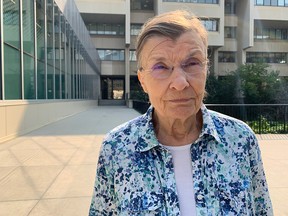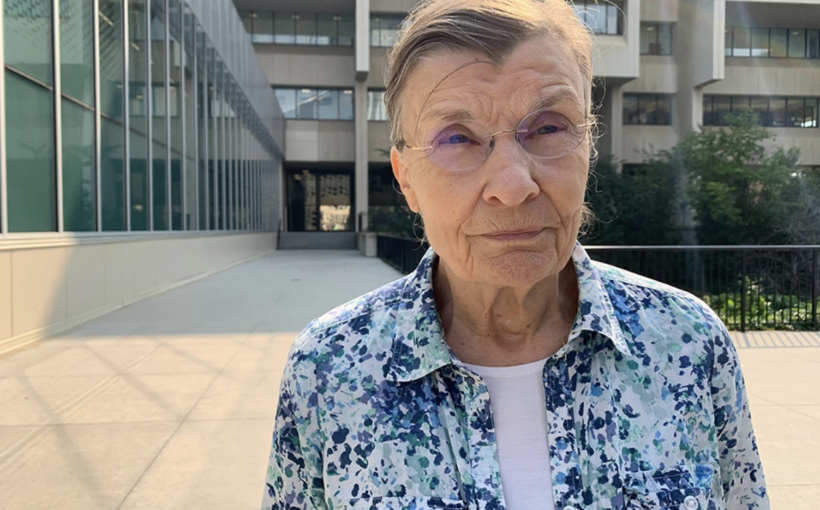
It wasn’t until later that Penn learned the man she agreed to loan nearly $350,000 was in fact an undischarged bankrupt man working as a part-time landscaper.
On Thursday, Alberta Court of King’s Bench Justice Shaina Leonard found Bayne and an associate, Mary Cooney, guilty of defrauding Penn of most of her life savings over nearly five years.
Leonard said Bayne and Cooney deceived Penn and rejected claims they were pursuing bona fide business opportunities that simply fell through.
“The Crown describes Mr. Bayne’s recitations of what he was working on as ‘word salad’ and ‘performance art,’” Leonard said. “I agree with this characterization.
“Mr. Bayne strung together phrases in a way that was intended to make his project sound complicated and sophisticated. Despite this, when the words are examined closely, they have very little concrete meaning. There is nothing within his explanations that help the listener understand what he was actually doing.”
Penn, a psychotherapist in her 60s, came to Canada from the Netherlands in 2009 to attend a seminar by Edmonton spiritual leader John de Ruiter. She began living in Canada full-time in 2013. She eventually left de Ruiter, who was charged with seven counts of sexual assault earlier this year for allegedly inducing followers to have sex with him.
Penn met Cooney, 60, at a de Ruiter event. The two bonded over a shared interest in spirituality and alternative medicine and in early 2013 went for coffee. Penn told Cooney she had terminal cancer in the early 2000s but made a full recovery by foregoing conventional treatment. In appreciation, she loaned a large sum of money to a group called the Ayurvedic College Clinic.
When the clinic failed to pay her back, Penn sued and recovered around 400,000 euros.
Cooney told Penn about Bayne, claiming he could help invest in worthy humanitarian projects. The three later met, and Bayne explained his vision for a new system for funding farming, clean water and sustainable housing projects “without leaving this heavy debt burden on those who could least afford it.”
Penn was excited and agreed to loan Bayne $100,000 with a promise of 100 per cent interest. She transferred the money to an entity called Grace Endowment, which Penn said Cooney led her to believe was a charity.
The “endowment” was in reality Cooney’s personal bank account. After Penn’s first deposit, Bayne told Cooney she could take 10 per cent of the funds as an “administrative” fee. She also moved money on behalf of Bayne, who owed creditors $600,000 after losing a 2012 lawsuit. After Penn made her first deposit, Cooney transferred $8,400 to Bayne’s landlord, and another $3,000 to Bayne’s wife.
Penn eventually learned the money was going to cover Bayne’s personal expenses, but agreed to loan more money because she still believed she would be repaid. Bayne repeatedly told stories about where the returns would come from, including a wealthy Chinese “dynasty” and a safe in New York containing billions of dollars. At one point, Penn put up $20,000 to explore a Bitcoin scheme.
Leonard said Penn was “naïve, gullible and easily led,” but Bayne and Cooney nevertheless defrauded her.
Leonard concluded Bayne was never working on the projects he claimed to be. The defence produced no paper trail to support Bayne’s claim he was “engaging businesspeople on the international stage to invest millions of dollars.” Nor was Bayne’s evidence credible, Leonard said, noting Bayne was previously found to have lied under oath in a bid to evade creditors.
“I do not believe that Mr. Bayne brought any skills or knowledge to the table that would have enticed extremely wealthy people to invest in his theories,” she said. “Further, if he had access to this cadre of people, he would not have had to depend on Ms. Penn for financial backing.”
Penn told Postmedia she is pleased with the ruling. Sentencing for Bayne and Cooney is expected to take place this fall.



